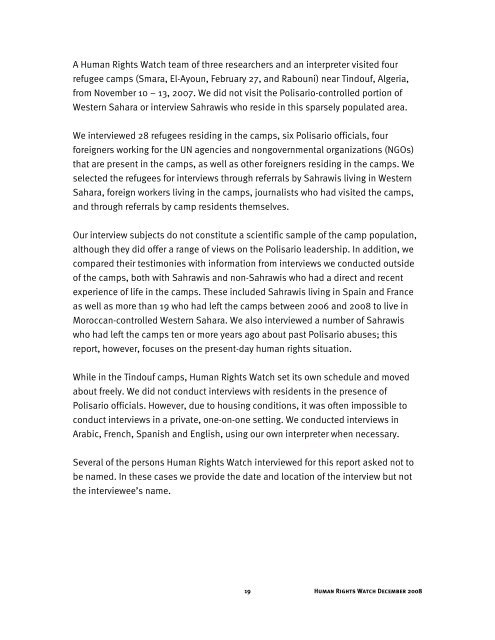Download full report with cover - Human Rights Watch
Download full report with cover - Human Rights Watch
Download full report with cover - Human Rights Watch
Create successful ePaper yourself
Turn your PDF publications into a flip-book with our unique Google optimized e-Paper software.
A <strong>Human</strong> <strong>Rights</strong> <strong>Watch</strong> team of three researchers and an interpreter visited four<br />
refugee camps (Smara, El-Ayoun, February 27, and Rabouni) near Tindouf, Algeria,<br />
from November 10 – 13, 2007. We did not visit the Polisario-controlled portion of<br />
Western Sahara or interview Sahrawis who reside in this sparsely populated area.<br />
We interviewed 28 refugees residing in the camps, six Polisario officials, four<br />
foreigners working for the UN agencies and nongovernmental organizations (NGOs)<br />
that are present in the camps, as well as other foreigners residing in the camps. We<br />
selected the refugees for interviews through referrals by Sahrawis living in Western<br />
Sahara, foreign workers living in the camps, journalists who had visited the camps,<br />
and through referrals by camp residents themselves.<br />
Our interview subjects do not constitute a scientific sample of the camp population,<br />
although they did offer a range of views on the Polisario leadership. In addition, we<br />
compared their testimonies <strong>with</strong> information from interviews we conducted outside<br />
of the camps, both <strong>with</strong> Sahrawis and non-Sahrawis who had a direct and recent<br />
experience of life in the camps. These included Sahrawis living in Spain and France<br />
as well as more than 19 who had left the camps between 2006 and 2008 to live in<br />
Moroccan-controlled Western Sahara. We also interviewed a number of Sahrawis<br />
who had left the camps ten or more years ago about past Polisario abuses; this<br />
<strong>report</strong>, however, focuses on the present-day human rights situation.<br />
While in the Tindouf camps, <strong>Human</strong> <strong>Rights</strong> <strong>Watch</strong> set its own schedule and moved<br />
about freely. We did not conduct interviews <strong>with</strong> residents in the presence of<br />
Polisario officials. However, due to housing conditions, it was often impossible to<br />
conduct interviews in a private, one-on-one setting. We conducted interviews in<br />
Arabic, French, Spanish and English, using our own interpreter when necessary.<br />
Several of the persons <strong>Human</strong> <strong>Rights</strong> <strong>Watch</strong> interviewed for this <strong>report</strong> asked not to<br />
be named. In these cases we provide the date and location of the interview but not<br />
the interviewee’s name.<br />
19 <strong>Human</strong> <strong>Rights</strong> <strong>Watch</strong> December 2008


